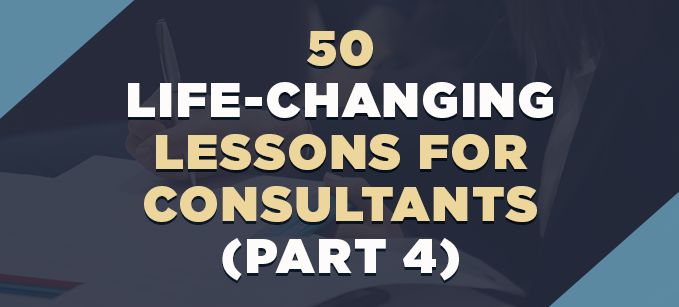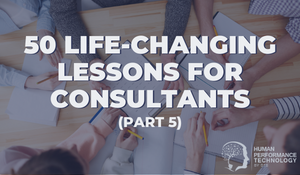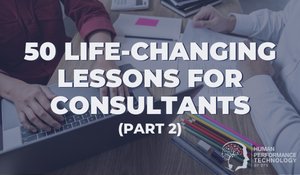50 Life-Changing Lessons for Consultants (Part 4)

Inspired by an article called 45 Valuable Life Lessons For People Of Any Age, we took some time out to reflect on the most valuable business lessons we have collected from 40+ years of experience in the talent management industry. This is part 4 of 5 in the series.
31. Sell First, Create Later.
There is often a temptation among trainers to spend months in R&D mode, wrapped up in researching and developing new content and training programs, getting everything 100% perfect before getting out and prospecting. As a general rule, we recommend the reverse: sell the job first, create and customise the content later.
32. Stay in Front of People.
Send people articles once a week. Join LinkedIn, Twitter, Facebook. Put together a short YouTube clip using your phone. Create a professional newsletter. Use an automated marketing system for setting up and scheduling emails. Attend networking events. Update your website and ask for feedback from customers. There are plenty of options available, so make sure you have a way of staying in regular contact.
33. Initiate Referrals.
Don’t assume that a job well done will automatically lead to a word-of-mouth windfall. People get busy and forget. Strike while the iron is hot. Initiating referrals is a MUST and can be as simple as a question: “Is there anyone you know who would benefit from the process when went through today?... Would you mind if we were introduced?”
34. Initiate Testimonials and Case Studies.
According to 2013 research conducted by LinkedIn, out of 30 marketing tactics, customer testimonials was cited as the most effective marketing tactic by B2B marketers, followed closely by case studies. There are a number of websites that provide templates, structures and options for making the process of writing testimonials quick and easy for customers.
35. Don’t Think Like a Brand, But Do Think Seriously About Personal Branding.
Even though you may be selling products and services in your name, you are a human being, not a legal entity. People want to know that you are authentic, not the artificial creation of focus groups, Photoshop, and claptrap marketing slogans taken from bullshitgenerator.com. There’s nothing that needs to be disingenuous about being a good marketer, which is really what the personal branding trend is all about. You may want to reassess your appearance, look at getting professional photos done, change your main marketing message, look at the 4-Ps of marketing (product, price, positioning, placement), craft an “elevator pitch,” put together a professional brochure, learn more about SEO, Google AdWords, website optimisation, learn to use your CRM more effectively, purchase a contact database, blog, connect with people on LinkedIn, and build a presence on social media. This all takes time and, of course, it isn’t for everyone, but there is an abundance of information about all of these things, all at the click of a mouse. Like passive income, personal branding is an upfront investment that is intended to pay dividends in the long run.
36. Know Your Google Standing.
It’s becoming the norm for companies to Google candidates as part of the recruitment process and the same applies to consultants. This means: fix your LinkedIn profile or remove it!
37. Don’t Use @gmail.com / @hotmail.com.
It would be nice if we lived in a world where people were judged solely on the basis of their character, not on the extension of their email address. Alas, we don't live in this world. First impressions count in business. A generic email extension can be viewed by some clients as akin to wearing a singlet with thongs instead of a suit and tie. As a consultant, there is a heightened expectation that others will have of you to be professional, so don’t let this seemingly small thing make a big dent in your credibility.
38. Get Your Geek On.
Tech gadgets can save you loads of time and make life (and business) so much easier. In our office, some of the programs and devices we use include: Xero (accounting software), Evernote (note sharing), InfusionSoft (CRM and marketing), iPads/iPhones (especially for sending emails remotely), LogMeIn (remote access to computers), Skype (international calls), DropBox (file sharing), Seagate External hard drives (large file storage), MindJet (mind mapping program), Elluminate (web conferencing).
39. Templates Are Your Friend.
When asked to submit a proposal, training or coaching course overview, invoice, trainer/coach bio, brochure or flyer, the documents shouldn’t be created from scratch every time. This much should be obvious. What’s often forgotten, however, is the many emails and documents you’ve written over the years that could be used as templates in the future. For example, look at some of your recent emails to see what questions customers get confused about most and include an FAQ section on your website. Now, when you get that question again in future, rather than spending 30 minutes on an email explaining it from scratch, copy and paste the words from the FAQ and include a link in case they want to read more. Congratulations, you’ve just saved yourself hours of future work through the power of templates!
40. When Emailing:
- As a general rule, write your emails in a way that assumes other people will eventually read it, even if you believe that nobody else (other than the receiver) will ever lay eyes on what you write.
- Bold key parts. (People tend to skim things).
- Beware the “reply all” button.Never type angry.
- The phone often works better than email when you need to clarify something in detail; however, email should always be used to confirm important information from a phone conversation.
Continue to part 5 in the series. To see part 1, go here.
Topics:
General Business
Theo Winter
Client Services Manager, Writer & Researcher. Theo is one of the youngest professionals in the world to earn an accreditation in TTI Success Insight's suite of psychometric assessments. For more than a decade, he worked with hundreds of HR, L&D and OD professionals and consultants to improve engagement, performance and emotional intelligence of leaders and their teams. He authored the book "40 Must-Know Business Models for People Leaders."



We Would Like to Hear From You (0 Comments)